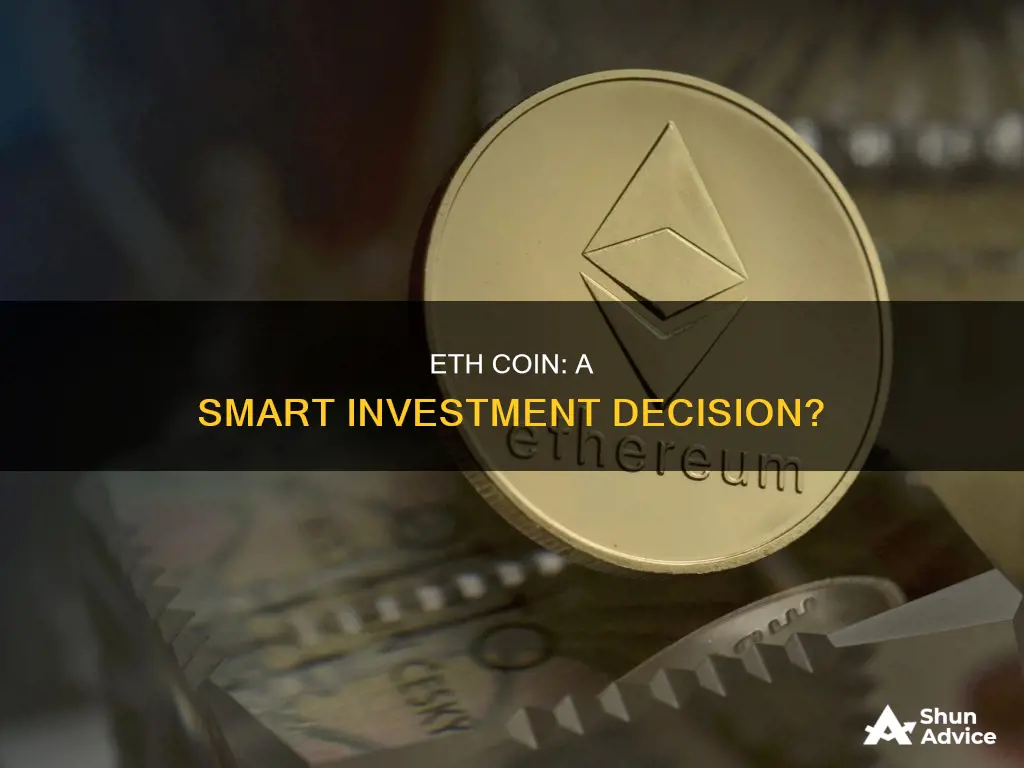
Ethereum is a dominant force in the cryptocurrency market, but that doesn't mean it's risk-free. It is a smart contract platform with lofty goals, including replacing Wall Street. It has already started to see company shares and bonds tokenized on its network as part of some business transactions.
Ethereum is a good investment, and its potential is much more remarkable than even Bitcoin's. This is because it acts as a platform for developers to build and innovate through continuing research. The recent DeFi trend is one area worth watching as it allows for a new way to approach banking. DeFi will allow permissionless lending and borrowing instead of dealing with a traditional bank.
Ethereum is also one of the most proactive blockchains in developing and upgrading its network. Following the Merge in 2022, which cut energy usage by an estimated 99.95%, other upgrades are in the pipeline, only helping to further boost its performance.
Ethereum remains, by far, the most popular network for decentralized app (dApp) builders and developers, with almost 1,000 major protocols built on its network as well as thousands of meme tokens and NFT collections. In fact, Ethereum's TVL (total value locked, the combined value of projects built on its network) is over $50 billion, more than five times that of its nearest rival Tron ($9.8 billion TVL).
Ethereum has been performing well since its official launch in 2014, when the price of ETH was just $0.31 during its initial coin offering (ICO). Based on the asset's past performance, it will likely have provided great returns to investors who gave it enough time to grow. Regardless of when an investor picked up ETH, historically, it's been possible to turn a profit simply by waiting, making ETH a great long-term crypto investment.
Ethereum is an attractive cryptocurrency investment option, primarily concerning long-term investors. High capitalization and sufficient liquidity, decentralization, and reliability ensure a stable exchange rate for the coin and its predictability. In addition to direct benefits, cryptocurrency traders can receive passive income from staking and liquidity supply and invest in hundreds of dApps, NFTs, games, and other projects.
However, it is important to remember that the crypto market is highly volatile and unstable. Even digital assets with multi-billion-dollar market capitalization cannot be called reliable. Therefore, it is crucial to do your own research and carefully consider your investment goals, risk tolerance, and financial situation before investing in Ethereum or any other cryptocurrency.
| Characteristics | Values |
|---|---|
| Market Capitalization | As of August 22, 2024, Ethereum's market capitalization was $316.71 billion. |
| Key Use Cases | Decentralized Finance (De-Fi), Decentralized Autonomous Organizations (DAOs), Non-Fungible Tokens (NFTs), and Decentralized apps or Dapps. |
| Price History | Ethereum's price has fluctuated since its launch in 2014. It reached an all-time high of $4,878.26 in November 2021 but has experienced declines since then. |
| Price Predictions | Cryptonewz predicts that Ethereum will reach $5,000 by the end of 2024. Other predictions for 2025 and 2030 range from $6,500 to $20,500. |
| Investment Performance | Ethereum has been one of the best-performing cryptocurrencies in the long term. It has provided significant returns to investors, and its price has increased by millions of percent since its launch. |
| Investment Risks | Ethereum is a risky and volatile investment due to its high price fluctuations. The crypto market is highly unpredictable, and even digital assets with large market capitalizations cannot be considered reliable. |
| Investment Opportunities | Ethereum has strong investment potential due to its advanced features, innovative blockchain solutions, and expanding use cases. It is widely recognized and has a large community of developers and users. |
What You'll Learn

Ethereum's use cases
Ethereums Use Cases
Ethereum is a blockchain platform that supports smart contracts and secure financial transactions. Its native cryptocurrency is Ether. Ethereum is adding value to myriad industries with a host of novel solutions to longstanding problems. Here are some of its use cases:
- Decentralized Autonomous Organizations (DAOs): DAOs are blockchain-based organizations that operate without central authorities. They are governed by rules coded in software and administrative decisions are voted on by a community of stakeholders.
- Decentralized Finance (DeFi): DeFi platforms are reinventing traditional financial products and services, adding programmable and decentralized features to create brand new financial products.
- Non-Fungible Tokens (NFTs) and Digital Collectibles: NFTs are digital assets that are unique and cannot be replicated or replaced by another asset. They are often used to represent ownership of assets like artworks, collectibles, and even precious metals.
- Smart Contracts and Decentralized Applications (DApps): Smart contracts are self-executing contracts that are recorded on the Ethereum blockchain. They can be used to create decentralized applications, which run on decentralised networks and are not under any central control.
- Identity and Self-Sovereign Identity (SSI): SSI gives users control over their digital identity. This data can be stored on the Ethereum blockchain, and users can choose who to share it with.
- Supply Chain Management and Traceability: The Ethereum blockchain improves supply chain management by creating a transparent ledger of all transactions. It also makes it easier to track the flow of goods and services through the supply chain.
- Energy and Carbon Emissions Tracking: The Ethereum blockchain can track energy consumption and carbon emissions, which is essential for industries such as transportation, manufacturing, and mining.
- Healthcare Data Management: Ethereum can be used to create a public and secure data network for the healthcare sector, allowing any hospital or doctor to access patient data and records at any time.
- Governance: The Ethereum blockchain plays a vital role in creating governance systems that are more efficient than standard systems, as smart contracts can be used to encode the rules that govern an organisation.
- Cross-Border Payments and Remittances: Ethereum can be used to send international remittances, which are often slow and expensive, in a fast and cost-effective way.
These use cases demonstrate the wide range of applications for Ethereum and its potential to revolutionise various industries.
Dogecoin Investing: A Guide for Indians
You may want to see also

Ethereum's price history
The initial coin offering (ICO) for Ethereum took place in 2014, with the price of one ETH set at $0.31. The price remained relatively stable until 2017, when the wider crypto market began to gain traction. In May 2017, the price of ETH surpassed $100 for the first time, skyrocketing to $414 in June before correcting.
Ethereum's price continued to fluctuate over the next few years, with highs and lows influenced by broader market trends and developments within the Ethereum ecosystem. In January 2018, the price of ETH peaked at $1,418 before experiencing a sharp decline. It took three years for the cryptocurrency to retest this all-time high, and in May 2021, the price of ETH more than tripled to set a new record of $4,379.
However, the crypto market entered a prolonged bear market after these highs, with macroeconomic factors such as the Russia-Ukraine War, inflation, and the collapse of crypto companies like FTX causing a dip in prices. Ethereum's price fell below $1,000 in mid-2022 and continued to experience volatility throughout the year.
In 2023, Ethereum's price saw a steady recovery, reaching a yearly high of $2,120 in April. This positive trend continued into 2024, with the price of ETH surpassing $4,000 in March and trading at around $2,687.73 in August.
Despite the ups and downs, Ethereum has consistently been the second-largest cryptocurrency by market capitalisation, and its popularity among decentralised app (dApp) developers has contributed to its resilience and potential for future growth.
Exploring Bitcoin Tech: Where Investments Are Headed
You may want to see also

Ethereum's future price predictions
End of 2024: According to Cryptonewz, Ethereum is expected to reach $5,000 by the end of 2024. This prediction is supported by the anticipated recovery of the economy, the upcoming Bitcoin halving, and the continued improvements to the Ethereum network.
End of 2025: Ethereum is forecast to reach a maximum level of $6,500 by the end of 2025, with an average price of around $5,500. This prediction takes into account the time needed to build positive traction, continued updates, and the widespread adoption of crypto.
End of 2030: Looking further ahead, Ethereum's price could reach $7,985, or even surpass $10,000, by the end of 2030. This projection is based on the expected growth of the crypto market, anticipated developments in the Ethereum network, and the potential for increased demand for decentralized applications and smart contracts.
It is important to remember that these predictions are speculative and subject to change due to the dynamic nature of the cryptocurrency market.
Silver Coin Investment: US Mint's Worth?
You may want to see also

Ethereum's advantages over Bitcoin
Ethereum (ETH) is the second most popular digital token after Bitcoin (BTC). While both are similar in many ways, there are some significant differences between the two. Here are some of the advantages that Ethereum has over Bitcoin:
- Complex Smart Contracts: Ethereum is designed for complex smart contracts and decentralized applications (dApps), which are believed to be part of the emerging infrastructure of the future of the internet known as Web3. Bitcoin, on the other hand, is primarily designed to be an alternative to traditional currencies.
- Transaction Speed: Ethereum can carry out about 15 transactions per second, while Bitcoin can only manage seven. With the expansion of blockchain scalability, the speed of transactions in Ethereum can increase even more.
- Proof-of-Stake: In September 2022, Ethereum moved to a proof-of-stake (PoS) model, which is less energy-intensive than the proof-of-work (PoW) model used by Bitcoin. In PoS, validators stake their cryptocurrency holdings to activate the ability to create new blocks, rather than using computational power to mine blocks.
- Lower Energy Consumption: The shift to proof-of-stake has led to a 99.95% decrease in energy consumption on the Ethereum network.
- Higher Transaction Fees: While this may seem like a disadvantage, higher transaction fees on the Ethereum network can attract more miners, potentially leading to faster transaction processing times.
- Decentralized Applications: Ethereum is the most popular network for dApp developers, with almost 1,000 major protocols built on its network.
- NFTs: A large portion of the best non-fungible tokens (NFTs) are built on the Ethereum network, including Crypto Punks and the Bored Ape Yacht Club.
- Interoperability: Ethereum's smart contract ecosystem facilitates interoperability between applications, allowing new projects to take advantage of the benefits offered by an established network.
Bitcoin Mining in India: A Guide to Getting Started
You may want to see also

Ethereum's disadvantages and risks
Ethereums Disadvantages and Risks
As with any investment, there are risks and challenges associated with investing in Ethereum. Here are some key disadvantages and risks to consider:
- Scalability and Congestion: Ethereum has faced significant scalability challenges, especially during periods of high network congestion. The blockchain's limited capacity can lead to slower transaction confirmation times and higher fees, which may discourage users and developers.
- Competition: Ethereum faces competition from other blockchain platforms like Solana, Binance Smart Chain, and Polkadot, which offer improved scalability and lower fees. The popularity of these alternatives can reduce demand for Ethereum, potentially lowering the price of Ether.
- Security Threats: While Ethereum is considered secure, vulnerabilities in smart contracts have led to high-profile hacks and exploits. These security threats pose a risk to investors, and it is essential to take preventive measures such as stronger passwords and secure wallets.
- Regulatory Concerns: The price movement of Ethereum is influenced by regulations and its legal status. As cryptocurrency regulations are relatively new and evolving, there is uncertainty about how future regulatory changes might affect the price of Ether.
- Volatility: Like other cryptocurrencies, Ethereum is subject to high price volatility. The value of Ether can fluctuate widely in a short period, leading to potential significant losses for investors.
- Complexity: Development on the Ethereum platform can be complex and resource-intensive, particularly for newcomers. The process of creating and auditing smart contracts requires expertise and additional resources, making it challenging for those without a technical background.
- High Transaction Fees: Ethereum's high transaction fees have been a significant drawback, preventing the network from achieving mass adoption. Retail investors with limited capital may opt for alternative blockchains with lower fees, impacting the demand for Ethereum.
- Quantum Computer Threat: Quantum computers pose a potential threat to the cryptographic systems used on the Ethereum blockchain. While there is currently no known quantum computer accessible to hackers, they could potentially break cryptographic algorithms and compromise the network.
- Long-term Growth Uncertainty: While Ethereum has a strong track record and a dedicated community, its future growth is not guaranteed. The blockchain industry is evolving rapidly, and new technologies or platforms could emerge that could challenge Ethereum's dominance.
- Environmental Concerns: Ethereum has faced criticism for its energy consumption, especially before the transition to Proof-of-Stake (PoS). The previous Proof-of-Work (PoW) consensus mechanism required significant computational power and energy, contributing to carbon emissions.
Perth Mint Coins: Smart Investment or Not?
You may want to see also
Frequently asked questions
Ethereum is a good investment in 2024. It is constantly working on developing new features, and most people expect ETH to slowly increase in value.
It is difficult to predict the value of an asset in the future, but based on the growth of the crypto market and the planned improvements to the Ethereum network, we could see the value of ETH at around $5,000 by 2025 and around $7,500 in five years.
If you were debating buying ETH at $4,000+ it is most probably worth buying today.
While every investment has its own risks, the general consensus among professional investors and traders seems to be that Ethereum will grow steadily over the coming years.
The crypto market is strongly volatile and unstable. Even digital assets with multi-billion-dollar market capitalization cannot be called reliable.







